
Ukraine war raises China’s ‘imported inflation’ concern as oil, nickel prices surge
- China’s producer price index (PPI) growth rose at the slowest pace in eight months in February, but rising commodity prices have started to filter through
- Benchmark Brent crude oil hit US$139.13 per barrel on Monday amid the ongoing Ukraine crisis, increasing the risk of ‘imported inflation’ for China
Wild swings in the prices of energy, metals and other raw materials triggered by Russia’s invasion of Ukraine may start to weigh on China’s economy as inflation concerns outweigh worries over production costs and supply chain disruptions, according to analysts.
Global benchmark Brent crude oil prices have fallen from reaching over US$139 per barrel on Monday, but still increase the risk of “imported inflation” for China, according to Lu Zhengwei, chief economist at Industrial Bank.
“China is the world’s major importer of commodities, and rising commodity prices may push up the year-on-year reading of its imports,” said Lu, who estimates that China’s crude oil imports account for around 10 per cent of its total imports by value.
But while the growth of the headline figure slowed, China’s PPI grew by 0.5 per cent from the previous month, the data released on Wednesday showed, marking the quickest month-on-month growth since a rise of 2.5 per cent in October.
China International Capital Corporation said that the escalating conflict between Ukraine and Russia, coupled with the long list of sanctions imposed by the US and European Union, will significantly drive up commodity prices and disrupt supply chains.
“We believe that this may lead to a slower year-on-year decline in PPI in the first half of the year,” the Chinese broker said.
China, Russia trade surges, but ‘alarm’ as overall export growth slows
“The high comparison base and headwinds from high commodity prices and supply chain disruption contribute to expectation that China’s export growth will continue to moderate,” said UOB Group.
China is the largest single buyer of Russian oil, having accounted for 20 per cent of exports last year according to data from International Energy Association, and has so far not banned imports.
How high oil prices will need to go depends primarily on how much and for how long the market will need to shun export barrels from Russia
“How high oil prices will need to go depends primarily on how much and for how long the market will need to shun export barrels from Russia and whether other buyers, such as China, will step in to increase its purchases of oil from Russia,” said Bjørnar Tonhaugen, head of oil markets at Rystad Energy.
The price of one of China’s other key imports, nickel, has also surged to a record high on both the domestic and international markets.
The Shanghai Futures Exchange said on Tuesday that it would take further measures to account for market conditions after the metal had surged to a record high of 228,810 yuan (US$33,254) per tonne.
The exchange, which earlier in the day raised its fees for nickel trading, urged investors to “fend off risks, invest rationally and work together to maintain market stability”, without giving further details.
‘No desire to pay’: China’s manufacturers feel the pain of Ukraine crisis
The volatility in nickel prices triggered concerns from investors in the state-owned Metallurgical Corporation of China.
On Tuesday, the Beijing-based construction firm assured investors that it does not have any exposure to the nickel futures market.
“At present, due to the influence of geopolitics, low inventory and financial markets, the price of international nickel metal futures has risen sharply and rapidly, which has deviated from the fundamentals,” said Metallurgical Corporation of China.
“High prices will be beneficial in the short term, but we must also pay attention to the ability of the downstream market to withstand [the higher cost of production].”
Russia is the world’s third largest supplier of nickel, accounting for nearly 13 per cent of the total global mining capacity in 2021, according to Rystad Energy.
“Fears over nickel supply disruptions following the Russia-Ukraine conflict continued to be aggravated, inciting extensive buying on both [London and Shanghai] platforms,” said Rystad Energy on Tuesday.
It is in nickel, metallurgical coal, copper and aluminium where there is scope for the two countries to expand trade
S&P Global Commodity Insight also said on Tuesday that Russia’s metal industry is expected to lean on China as an export market in response to the sanctions imposed following its invasion of Ukraine.
China’s unwrought non-alloy nickel imports from Russia hit 44,693 million tonnes in 2021, accounting for 20.3 per cent of China’s total imports of the metal.
“It is in nickel, metallurgical coal, copper and aluminium where there is scope for the two countries to expand trade, especially given China’s electric vehicle ambitions, which require a steady supply of nickel,” S&P Global Commodity Insight said.



